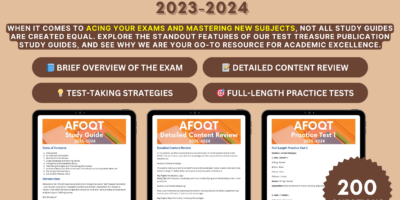How to Prepare for the AFOQT Arithmetic Reasoning Section
The Air Force Officer Qualifying Test (AFOQT) is a crucial step for aspiring Air Force officers. Among its subtests, the Arithmetic Reasoning section challenges many candidates. This section assesses your ability to solve basic arithmetic problems encountered in everyday life. Here’s an in-depth guide to help you prepare.
Understanding the Arithmetic Reasoning Section
This section consists of multiple-choice questions requiring calculations and logical reasoning. The problems often involve real-world scenarios like budgeting, scheduling, and other practical tasks. Familiarity with elementary math concepts is essential.
Brush Up on Basic Math Skills
Start by reviewing the fundamentals. Ensure you are comfortable with addition, subtraction, multiplication, and division. Refresh your understanding of fractions, decimals, and percentages. Websites like Khan Academy offer free resources that cover these topics comprehensively.
Use Practice Tests
Practice tests are invaluable. They acquaint you with the format and type of questions you’ll encounter. The official AFOQT practice tests available online are a good starting point. Regular practice builds confidence and highlights areas needing improvement.
Focus on Time Management
The Arithmetic Reasoning section is timed, requiring effective time management. Practice solving questions within set time limits. Use a timer during your practice sessions to simulate test conditions. Learn to balance speed with accuracy.
Learn to Identify Keywords
Test questions often contain keywords that indicate the required operation, such as ‘total,’ ‘difference,’ or ‘product.’ Practice identifying these to quickly determine the approach for solving each problem. This not only saves time but also reduces errors.
Break Down Problems
Complex problems can often be broken down into smaller, more manageable steps. For example, if a problem involves multiple operations, solve each step sequentially. Writing down intermediate steps can help avoid mistakes and keep your work organized.
Utilize Scratch Paper
Don’t hesitate to use scratch paper for calculations. It helps visualize problems and makes it easier to track your work. Neatly organize your work on the scratch paper to avoid confusion.
Understand Word Problems
Word problems can be tricky. Start by reading the question carefully. Identify what is being asked and what information is provided. Translate the words into a mathematical equation, then solve step by step. Practice with a variety of word problems to improve your skills.
Master Basic Geometric Concepts
Some questions may involve basic geometric concepts like area, perimeter, and volume. Familiarize yourself with the formulas for these concepts. Practice applying these formulas in different scenarios.
Review Mental Math Techniques
Mental math can save a lot of time. Practice techniques like estimating, rounding, and using multiplication shortcuts. These skills enhance your efficiency during the test.
Stay Relaxed and Focused
Anxiety can affect performance. Practice relaxation techniques like deep breathing and positive visualization. Stay calm, and don’t let difficult questions disrupt your focus. Move on and return to challenging problems later if time permits.
Consider a Study Group
Joining a study group can provide additional support. Discussing problems and sharing strategies with peers can deepen your understanding. It also provides motivation and accountability.
Use Mobile Apps for Practice
Several mobile apps are designed for math practice. Apps like Brainly and Photomath allow you to practice arithmetic reasoning on the go. These tools provide instant feedback and step-by-step solutions.
Seek Help If Needed
If certain concepts remain challenging, don’t hesitate to seek additional help. Tutors and online forums can offer explanations and solutions. Websites like Stack Exchange have communities dedicated to math help.
Track Your Progress
Maintain a record of your practice sessions. Note your scores, time efficiency, and areas needing improvement. Tracking progress helps in setting realistic goals and measuring improvements.
Understand Test Instructions
Before the test, familiarize yourself with the instructions. Understand the format, the number of questions, and the time allotted. Clear understanding avoids confusion on test day.
Get Adequate Rest Before the Test
A good night’s sleep is crucial. Rest well before the test day to ensure you are alert and focused. Fatigue can significantly impact performance.
Eat a Balanced Meal
Nutrition plays an important role in cognitive function. Eat a balanced meal rich in proteins and complex carbohydrates. Avoid heavy, greasy foods that can make you sluggish.
Stay Hydrated
Hydration affects concentration and mental clarity. Drink plenty of water before the test. Avoid caffeinated beverages that can lead to jitters or crashes.
Practice Regularly
Consistency is key. Regular practice ensures steady progress. Dedicate a specific time each day for studying and stick to it. Regularity builds muscle memory for problem-solving skills.
Visualize Success
Mental preparation is as important as academic preparation. Visualize yourself succeeding. Positive mindset boosts confidence and performance.
Understand Common Pitfalls
Be aware of common mistakes. For example, misreading questions or rushing through calculations. Identifying and correcting these pitfalls enhances accuracy.
Stay Positive
Maintaining a positive attitude during preparation and on test day is crucial. Believe in your preparation and abilities. Confidence can significantly impact your performance.
Following these strategies increases your chances of success in the AFOQT Arithmetic Reasoning section. Consistent practice and a positive mindset are your best tools. Prepare well, practice regularly, and approach the test with confidence.
“`
